Our current food system is a leading cause of some of the biggest challenges the world is currently facing, from climate change, resource depletion and waste, to malnutrition, disease and obesity. In order to transform the food system and create real impact, we are now calling on our community to help shape priorities for action over the next 3-5 years across the following mission areas:
- Healthier lives through food
- A net zero food system
- A fully transparent, resilient and fair food system
We are delighted to invite you to share your insights and add your contributions to one or more of these three mission areas. For each of the Missions, we have created a survey, which will take approximately 10 minutes to complete, click on the buttons below to connect to the survey.
Your insights will be used to help develop three initial three-year roadmaps which will identify and respond to the areas of greatest need in these mission areas where we can have a significant and distinctive impact.
You can complete the survey for more than one mission, so feel free to come back and select another mission area
About the EIT Food Missions
Our current food system is a leading cause of some of the biggest challenges the world is currently facing, from climate change, resource depletion and waste, to malnutrition, disease and obesity.
By 2050, we will need to feed and nourish more than 9 billion people in a safe, responsible and sustainable way. However, our resources for producing food, such as land, water and energy will be put under increasing pressure as our climate changes. This is expected to increase food insecurity, for instance by disrupting availability, reducing access and impacting on food quality and safety. Where food is constrained, prices may rise, and this introduces a greater risk of food fraud. Simultaneously, around one in three people are already suffering from some form of malnutrition, whether that be hunger, micronutrient deficiency, overweight or obesity.
The EIT Food community is addressing the complex and critical challenges of sustainability and climate change, of non-communicable diseases and poor nutrition, and of consumer trust, scarcity and transparency. Through our Missions-led approach, we will make a material difference to health adjusted life years by enabling more consumers to make better choices through access to healthier products and actionable information. We will be closer to a net zero food system, reducing carbon dioxide equivalent emissions by tackling carbon dioxide hotspots, reducing the footprint of proteins through diversification, and creating new markets for food waste. And we will see the benefits of more resilient, trusted food supply chains with people experiencing greater food security and safety through widespread digitally enabled food supply chains.
Healthier lives through food
The food system is influenced by many worldwide challenges and megatrends, such as population growth, globalisation, urbanisation and climate change. Policy influences the production of particular types of food, what food reaches which consumers and at what price. Whilst many factors influence consumers' dietary behaviours. Real progress to prevent unhealthy diets, malnutrition and non-communicable diseases (NCDs) across the lifecycle needs radical food systems transformation so that nutritious, safe, affordable and sustainable diets are available to all people.
A net zero food system
The European Union aims to be climate-neutral by 2050, that is, an economy with net zero greenhouse gas emissions. This objective is at the heart of the European Green Deal and in line with the EU’s commitment to global climate action under the Paris Agreement. The food system will play a key role in realising these sustainability targets. But what are the root causes, barriers and opportunities?
A fully transparent, resilient and fair food system
The development of global food systems over the past 30 years has markedly altered how food is produced, distributed and sold. While bringing about many changes for the better, it also greatly increases the risk of disease, contamination, fraud and abuse of our planet and the many who work in the food system. A radical rethink of the whole agri-food system is needed, from production to consumption, to policy and legislation. In order to do so, we need to review the barriers, opportunities and solutions for a pathway to a fully transparent, resilient and fair food system.

